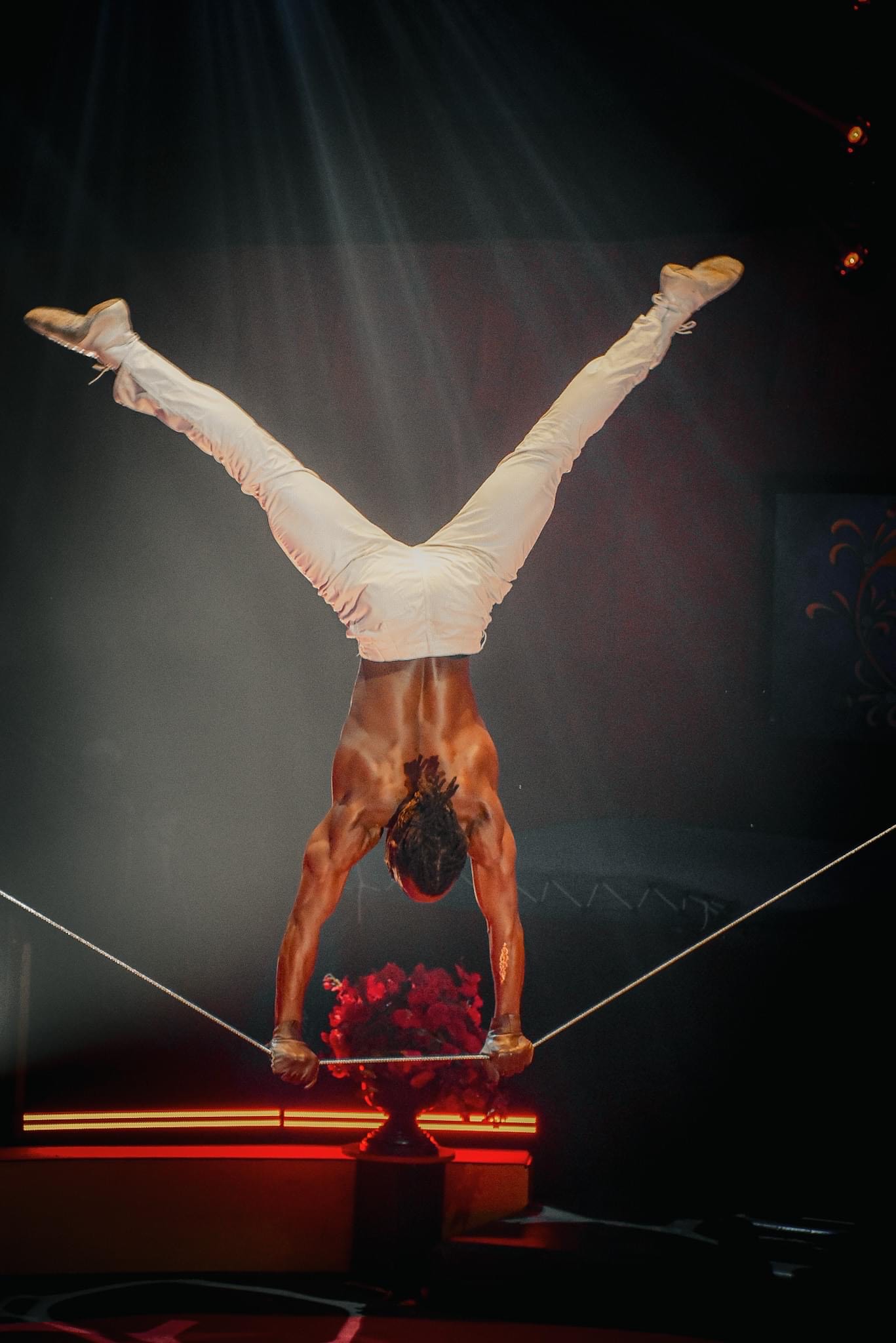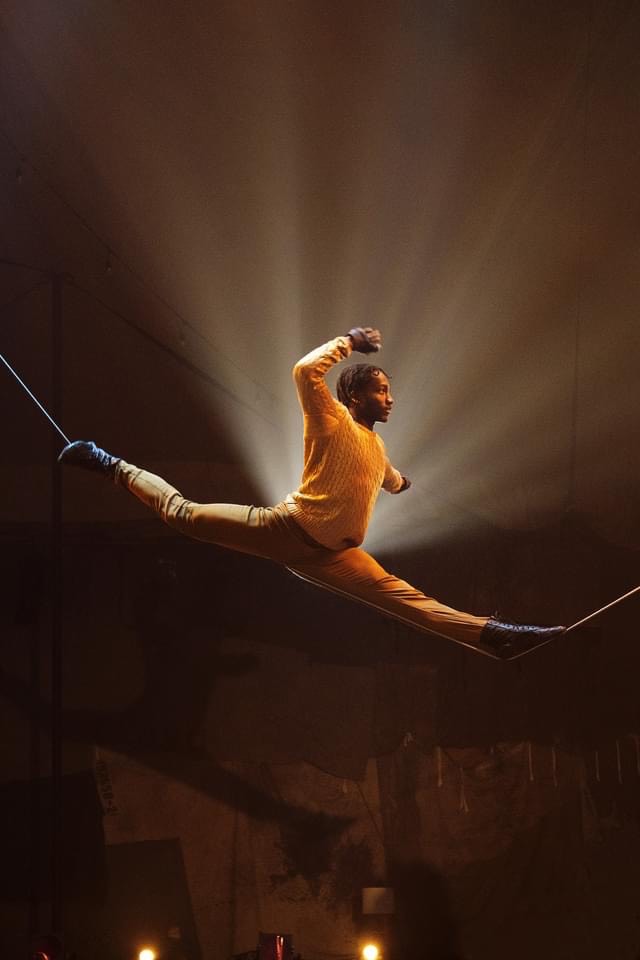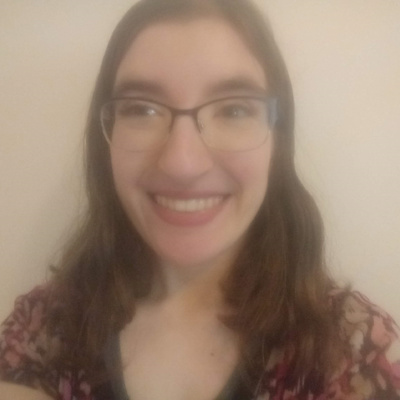Pathways Into Circus: Going to School with Cirque du Soleil’s Antino Pansa
Wondering how you can become a circus performer? Our Pathways Into Circus article series will spotlight professional circus artists whose career journeys can serve as a template for those hoping to find their own way. Today’s guest is slackwire artist Antino Pansa, whose path has led him from professional circus school to Cirque du Soleil’s ECHO.
One question we often receive here at CircusTalk is “How do I become a circus performer?” It sounds like such a simple, straightforward question on its face, doesn’t it? Yet so often in life it happens that what at first may seem straightforward turns out to be a lot more complicated than you ever would have guessed. In truth, a question like this has no easy answer. There is no single way, no one-size-fits all approach to entering a career as a circus performer. Just as every artist’s style and creative output is unique to them, the path that led them to the stage or the ring where they now stand before us is unique as well. What there are, however, are some common threads between different performers’ origin stories—some common pathways, if you will.
Maybe you were born into a multi-generation circus family and have been on the road, learning the tools of the trade, and carrying on that artistic legacy since before you were potty-trained. Maybe the circus came to your hometown as a kid and inspired you to learn the awe-inspiring feats you saw performed under the tent. Maybe you were a lifelong gymnast who pivoted from winning medals to winning parts in stage shows as an acrobat in order to support yourself. Maybe you were touched by a neighborhood social circus program and inspired down the same path yourself. Maybe you mastered your choice of discipline(s) through attending a professional circus school—or have been wholly self-trained since you started out. Or maybe you have just discovered your love of circus recently and want to know how to hone yourself and build the skills you need to make a full-fledged career as a performer. No matter what, you have worked hard to get to where you are today… and you’ll have to keep working hard on the journey ahead of you!
Our Pathways Into Circus series will spotlight working performers who forged or found their own way into circus and have advice to share with those who want to follow along the same path. Their journeys may sound like some of the “maybes” we’ve considered so far… or not at all. Every article will feature a professional performer who has made their name and career somewhere in the circus world—whether performing with a big-name company, starting their own, or flying solo—as well as their reflections on the career steps they took to get to where they are today, on the lessons and skills they needed to go from aspiring artists to artists who have sold themselves and showcased their acts in venues around the globe.
Is becoming a performer your goal? Then we all have the same destination in mind, so what works for one performer can work for you, too. When you’re still figuring out your own path, it’s good to learn from those who’ve made it there. Now light the way!
Today’s featured performer is French Gyanan slackwire artist Antino Pansa, currently on contract with Cirque du Soleil. Antino comprises one half of what may be the most iconic act in Cirque’s newest touring show, ECHO, where he and fellow slackwire artist Taras Hoi don deer-head masks, avoid the ground of flames below them, and walk on low-hanging wires inside the Cube that nearly overlap so much, an audience will wonder how their two paths don’t become entangled. In this article, the ever-adaptable Antino unmasks himself and shares with us his history as a performer.
From leisurely practice in a neighborhood circus school as a teen, Antino would begin to explore circus seriously as a career path, learning across disciplines, performing wherever he could, and honing in on his slackwire skills. He is an alum of three different schools—including Montreal’s prestigious École Nationale de Cirque—and has graced the stage of Young Stage festival as well as companies like the The 7 Finger and Cirque Monti. From ECHO’s current tour stop in Hallandale Beach, Florida, Antino tells us how his experiences as a circus student helped forge him into an artist and cement him as a true professional.
Carolyn Klein (CK): Tell us a bit about yourself and your background. How were you first introduced to the circus arts?
Antino Pansa (AP): I didn’t start with circus right away, maybe I did but I didn’t know. When I was 13 my dad made me try something he used to do when he was younger for fun. He brought me in front of the house and installed an old cut-off electric wire in between two coconut trees and stood on it and was able to balance. I was so mind-blown and impressed by what he just did, and wanted to be just like him. But the first time I tried it was so hard, and I tried it for weeks and couldn’t stand on it.
Then one day it broke, and my mom told me to never try again or I’d hurt myself. So I stopped until one of my neighbors opened a circus school. I was best friends with his son. After playing soccer in the afternoon he offered [for us] to go to his father’s house and try circus. I was very curious and thought, “Why not, let’s go!” And that’s how I was first initiated into circus and Slack Wire.
CK: What inspired you to pursue circus as a career path?
AP: When I started it was just leisure. I kept going for three years just for fun before my teacher, realizing I got better and better, offered to bring me to France to see how people do in circus schools in Europe. I went to all the big schools in France and Italy alongside five other kids. We got to see many shows, and then I realized you can actually make it your work. It made me even more motivated to get better and reach new goals.
CK: Tell us about your training history. What other schools and programs did you attend before going to ENC, and what did you study/learn from each of them?
AP: I first went to Latitude Cirque in French Gyana for 3 years. Which taught me almost everything: all the different circus disciplines.
Then I did one year in France at Piste d’azur, where I learned mostly acrobatics and trampoline, but also slackwire as my main discipline.
After that I went to ENC. My goal was to reach the highest levels in circus.
CK: What did you hope to gain by studying at ENC? What goals did you have for yourself, and how did you and your instructors work to achieve them?
AP: I gained a lot of discipline, how to focus and work on many different skills. My goal was to be different and bring the slackwire in a new way to the circus world. It was very special because my instructor was not a slackwire specialist but rather a tightwire coach, but they helped me to see the wire in a different way and explore new skills. My actual Slack Wire teacher from outside of school, Simone Benedetti, was always helping me with different tricks and ideas to explore.
CK: What other skills (non-discipline related) did your circus education provide or deepen?
AP: I learned discipline, how to sell myself, how to manage my Artist Life, how to negotiate contracts, how to create contacts, and more!
CK: Your bio says you also worked with several circus companies before attending ENC. Do you notice a difference in the kinds of performance opportunities/offers that you receive now vs. before graduating from circus school? If so, how do they compare?
AP: Before, there was a lot of work for free or for very little salary. I wasn’t being taken seriously. When I finished school I had a professional status and I was ready to live from this job and to get paid accordingly.
CK: How well did your circus education prepare you for your current contract at Cirque du Soleil?
AP: The education at school prepares you for contracts in general, whether it be Cirque du Soleil or 7 Fingers, Eloize… really any company around the world. It prepares you to adapt and get ready for anything, no matter the workplace.
CK: How would you advise a prospective circus student in their search for the ideal school? What key factors should they consider when reviewing school profiles?
AP: I would recommend them to look for a school that can feed them in various skills and disciplines. Because a multidisciplinary artist has more chances of getting work than one that has only one. But be really good at one and then have fun with the other; it’s work but also play.
CK: What advice would you give to a circus school graduate on transitioning from school to their professional career?
AP: Make sure your website is really clean and your videos are well-filmed. That you have enough pictures. Keep your social media updated and don’t be afraid, enjoy the journey. Read the contract 20 times before you sign and make sure you are happy and that you are being respected, because what you are doing is special. Be open and speak to people.
All photos are courtesy of the artist, Antino Pansa. ... Do you have a story to share? Submit your news story, article or press release.







